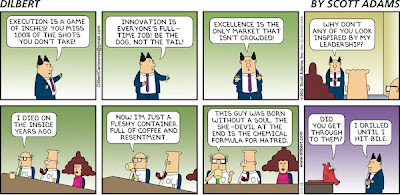Creative Types...
Just back from Annual Conference (possibly a post for another day) - exhausted - trying to accomplish something on Monday morning (and catching up on my article reading) I came across an article linked from HERE that talks about bias against creativity in business HERE
The thing is, it's not just in business. Creativity is eschewed in many areas of our culture. We are not taught, for example, to be creative in school. We are primarily taught to conform, right? How to spell correctly, how to sit in rows, how to write a "correct" composition, etc. Now, don't get me wrong, we need a certain amount of standardization (I HATE misspelled words, for example - especially when I do it) and there are always going to be (and there always needs to be) structures and systems in place that demand a certain amount of conformity (you dang well better drive on the right side of the road in the US, for example).
So...not a rant today. Just some quick observations. I'll actually debunk a few of them in the weeks to come (we're entering into some pretty creative territory in the church right now - which makes some people nervous, some people upset - but I'm excited - more to come...).
The group found a significant correlation between being creative and being seen as poor management material. "By definition, people will say creativity is positive," Mueller states. "It is almost impossible to get people to say they don't want creativity. But when someone actually voices a creative idea, there is a response of, 'Wow -- What is that?' This issue really comes to life at the moment the idea is voiced. There is discomfort when people encounter creativity."
And the article ends with:
The key is how companies view the traits associated with creativity. "There are some cultures where it is less of a problem than others," Mueller notes. "The question is, 'How do you think about descriptions like 'quirky' and 'unfocused'? If those traits are viewed only negatively, then you have more of a problem." It is important for firms with that view to examine these biases because "many companies want to be creative and they just don't know what they are doing wrong. Diagnosing that you are one of those companies is the first step in solving it."
Of course, Mueller is not arguing that every quirky, creative whiz is suited for a corner office. "Leaders require multiple skills, and creativity is just one of them," she says. "Some creative people don't have all those skills. But the challenge is to recognize those who do."
The thing is, it's not just in business. Creativity is eschewed in many areas of our culture. We are not taught, for example, to be creative in school. We are primarily taught to conform, right? How to spell correctly, how to sit in rows, how to write a "correct" composition, etc. Now, don't get me wrong, we need a certain amount of standardization (I HATE misspelled words, for example - especially when I do it) and there are always going to be (and there always needs to be) structures and systems in place that demand a certain amount of conformity (you dang well better drive on the right side of the road in the US, for example).
So...not a rant today. Just some quick observations. I'll actually debunk a few of them in the weeks to come (we're entering into some pretty creative territory in the church right now - which makes some people nervous, some people upset - but I'm excited - more to come...).


Comments